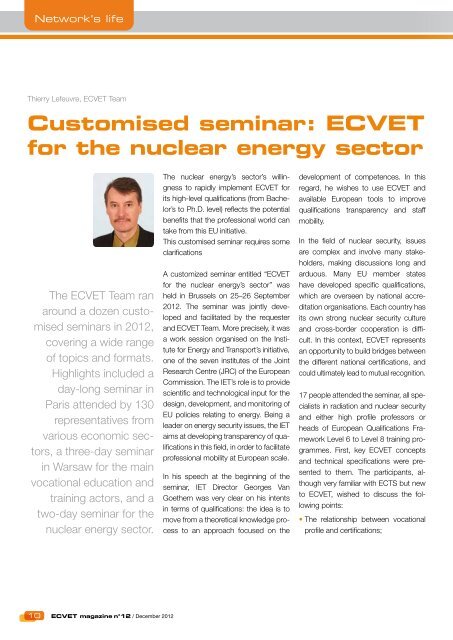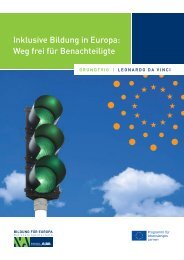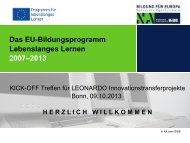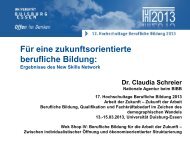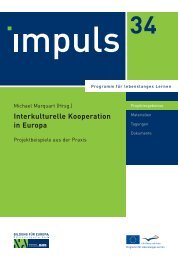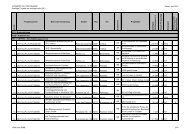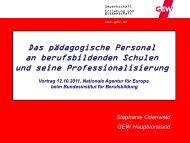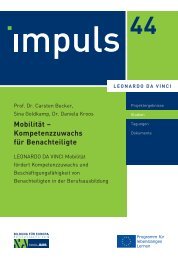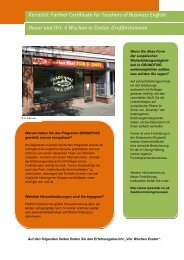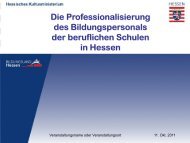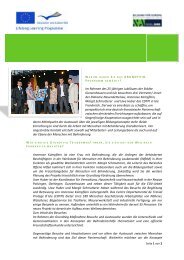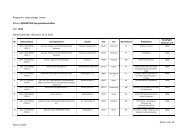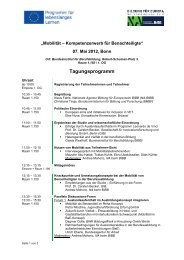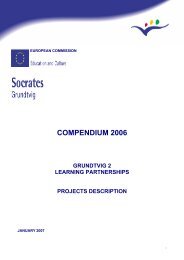You also want an ePaper? Increase the reach of your titles
YUMPU automatically turns print PDFs into web optimized ePapers that Google loves.
Network's life<br />
Thierry Lef<strong>eu</strong>vre, ECVET Team<br />
Customised seminar: ECVET<br />
for the nuclear energy sector<br />
The ECVET Team ran<br />
around a dozen customised<br />
seminars in 2012,<br />
covering a wide range<br />
of topics and formats.<br />
Highlights included a<br />
day-long seminar in<br />
Paris attended by 130<br />
representatives from<br />
various economic sectors,<br />
a three-day seminar<br />
in Warsaw for the main<br />
vocational education and<br />
training actors, and a<br />
two-day seminar for the<br />
nuclear energy sector.<br />
10 ECVET magazine n°12 / December 2012<br />
The nuclear energy’s sector’s willingness<br />
to rapidly implement ECVET for<br />
its high-level qualifications (from Bachelor’s<br />
to Ph.D. level) reflects the potential<br />
benefits that the professional world can<br />
take from this EU initiative.<br />
This customised seminar requires some<br />
clarifications<br />
A customized seminar entitled “ECVET<br />
for the nuclear energy’s sector” was<br />
held in Brussels on 25–26 September<br />
2012. The seminar was jointly developed<br />
and facilitated by the requester<br />
and ECVET Team. More precisely, it was<br />
a work session organised on the Institute<br />
for Energy and Transport’s initiative,<br />
one of the seven institutes of the Joint<br />
Research Centre (JRC) of the European<br />
Commission. The IET’s role is to provide<br />
scientific and technological input for the<br />
design, development, and monitoring of<br />
EU policies relating to energy. Being a<br />
leader on energy security issues, the IET<br />
aims at developing transparency of qualifications<br />
in this field, in order to facilitate<br />
professional mobility at European scale.<br />
In his speech at the beginning of the<br />
seminar, IET Director Georges Van<br />
Goethem was very clear on his intents<br />
in terms of qualifications: the idea is to<br />
move from a theoretical knowledge process<br />
to an approach focused on the<br />
development of competences. In this<br />
regard, he wishes to use ECVET and<br />
available European tools to improve<br />
qualifications transparency and staff<br />
mobility.<br />
In the field of nuclear security, issues<br />
are complex and involve many stakeholders,<br />
making discussions long and<br />
arduous. Many EU member states<br />
have developed specific qualifications,<br />
which are overseen by national accreditation<br />
organisations. Each country has<br />
its own strong nuclear security culture<br />
and cross-border cooperation is difficult.<br />
In this context, ECVET represents<br />
an opportunity to build bridges between<br />
the different national certifications, and<br />
could ultimately lead to mutual recognition.<br />
17 people attended the seminar, all specialists<br />
in radiation and nuclear security<br />
and either high profile professors or<br />
heads of European Qualifications Framework<br />
Level 6 to Level 8 training programmes.<br />
First, key ECVET concepts<br />
and technical specifications were presented<br />
to them. The participants, although<br />
very familiar with ECTS but new<br />
to ECVET, wished to discuss the following<br />
points:<br />
• The relationship between vocational<br />
profile and certifications;


